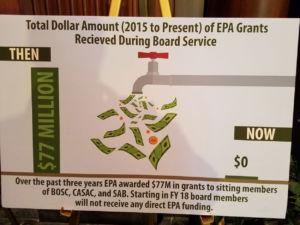EPA Cleans House After Obama-Era Advisers Pocket $77 Million in Grants
 “Political science” took on a whole new meaning under the Obama administration. Now we’re finding out just how politicized and cozy the relationships were between the environmental agency under the previous administration and the ostensibly objective scientists advising it.
“Political science” took on a whole new meaning under the Obama administration. Now we’re finding out just how politicized and cozy the relationships were between the environmental agency under the previous administration and the ostensibly objective scientists advising it.
The Environmental Protection Agency has identified tens of millions of dollars in government grants that were awarded to scientists at the same time they were serving on three of the powerful agency’s advisory boards. In other words, numerous scientists on advisory panels were deciding on national environmental regulations even as their pet projects received funding from the EPA–a textbook conflict of interest.
But the Heritage Foundation reports the lucrative grants to insider scientists just got axed by the new management in charge at the EPA.
The nation’s top environmental protection official signed a directive Tuesday aimed at preventing conflicts of interest while bolstering the independence and integrity of scientists who advise the government.
Under the new policy announced by Scott Pruitt, administrator of the Environmental Protection Agency, researchers and scientists who currently receive grants from the agency are not eligible to fill open slots on three science advisory groups.
“Whatever science comes out of EPA shouldn’t be political science,” Pruitt, appointed by President Donald Trump, told reporters during a press conference at EPA headquarters in Washington. “From this day forward, EPA advisory committee members will be financially independent from the agency.”

Leftist special interest groups predictably criticized Pruitt’s actions to clean up conflicts of interest that compromised the agency’s mission. But others welcomed the directive as long overdue house-cleaning.
Bonner Cohen, a senior fellow with the National Center for Public Policy Research, told The Daily Signal in an email that Pruitt’s directive will help recruit advisers with a fresh, independent perspective.
“By aggressively cleaning out the stables at EPA, Administrator Pruitt is showing a firm commitment to ending cronyism at the agency,” Cohen said. “For decades, EPA’s assorted advisory boards have been packed with people who could be relied upon to rubber-stamp EPA’s regulatory actions.”
At the same time, the EPA plans to open up more opportunities to serve on policy advisory boards to scientists from regions underrepresented under the previous administration.
Pruitt’s directive immediately affects the 47-member Science Advisory Board, which is charged with reviewing the quality of scientific information that underpins EPA regulations. The board also reviews EPA research programs and directly advises the administrator.
Terms for 15 members are set to expire, and the agency published a list of 132 possible candidates for the open seats.
Some on the list have expressed skepticism in one form or another toward the idea that human activity is the primary driver of climate change, to the consternation of some environmental advocacy groups.